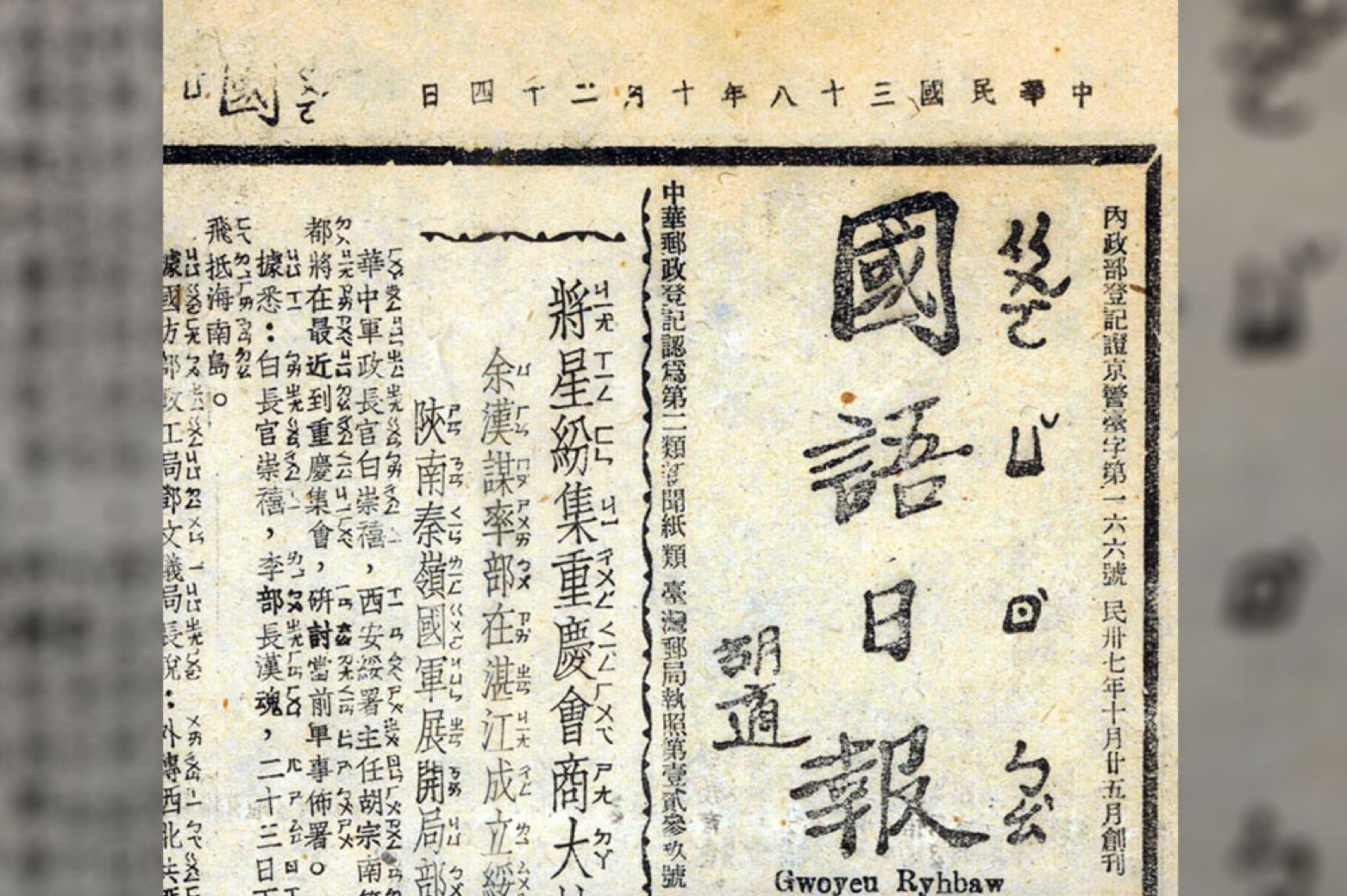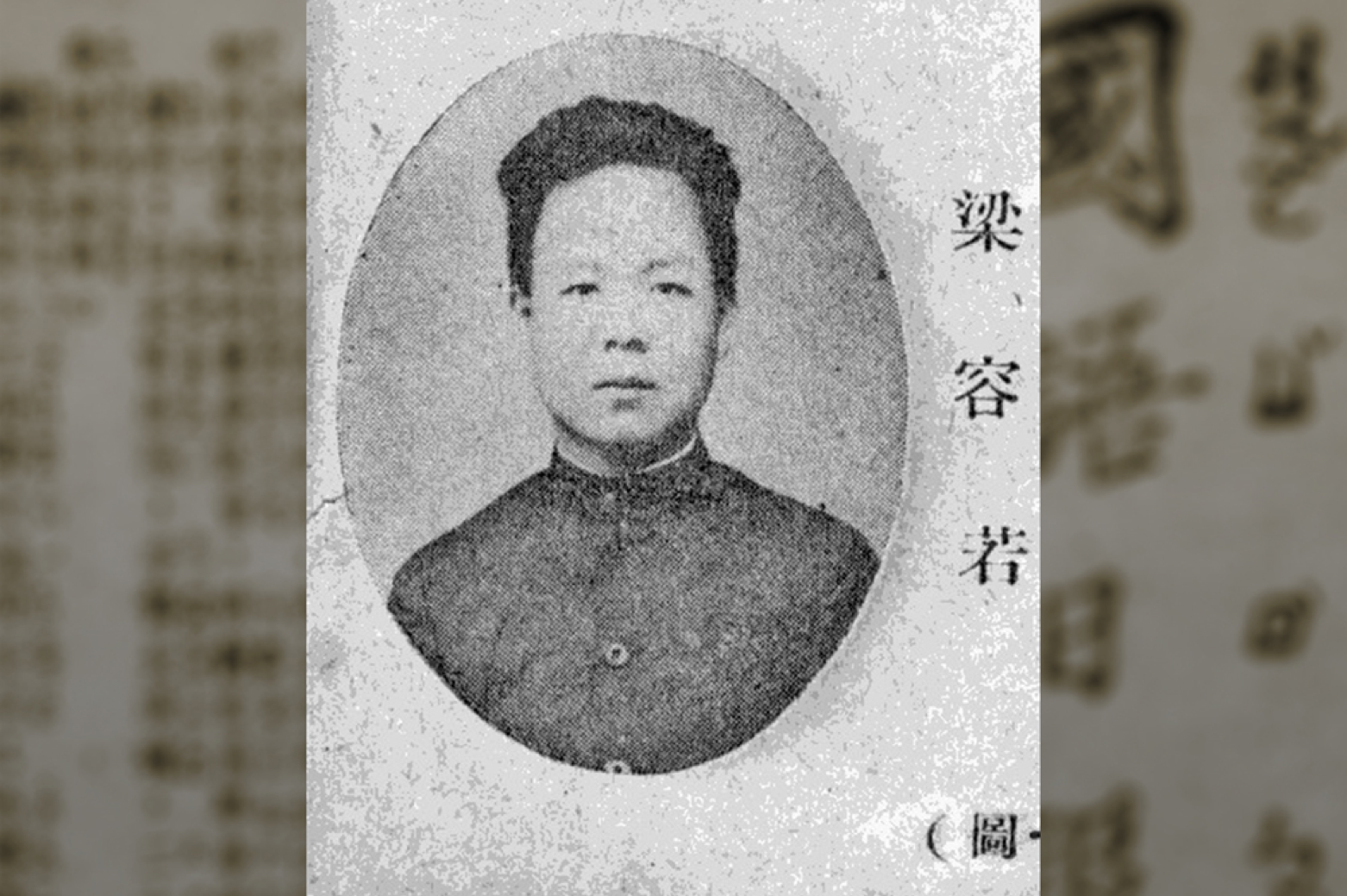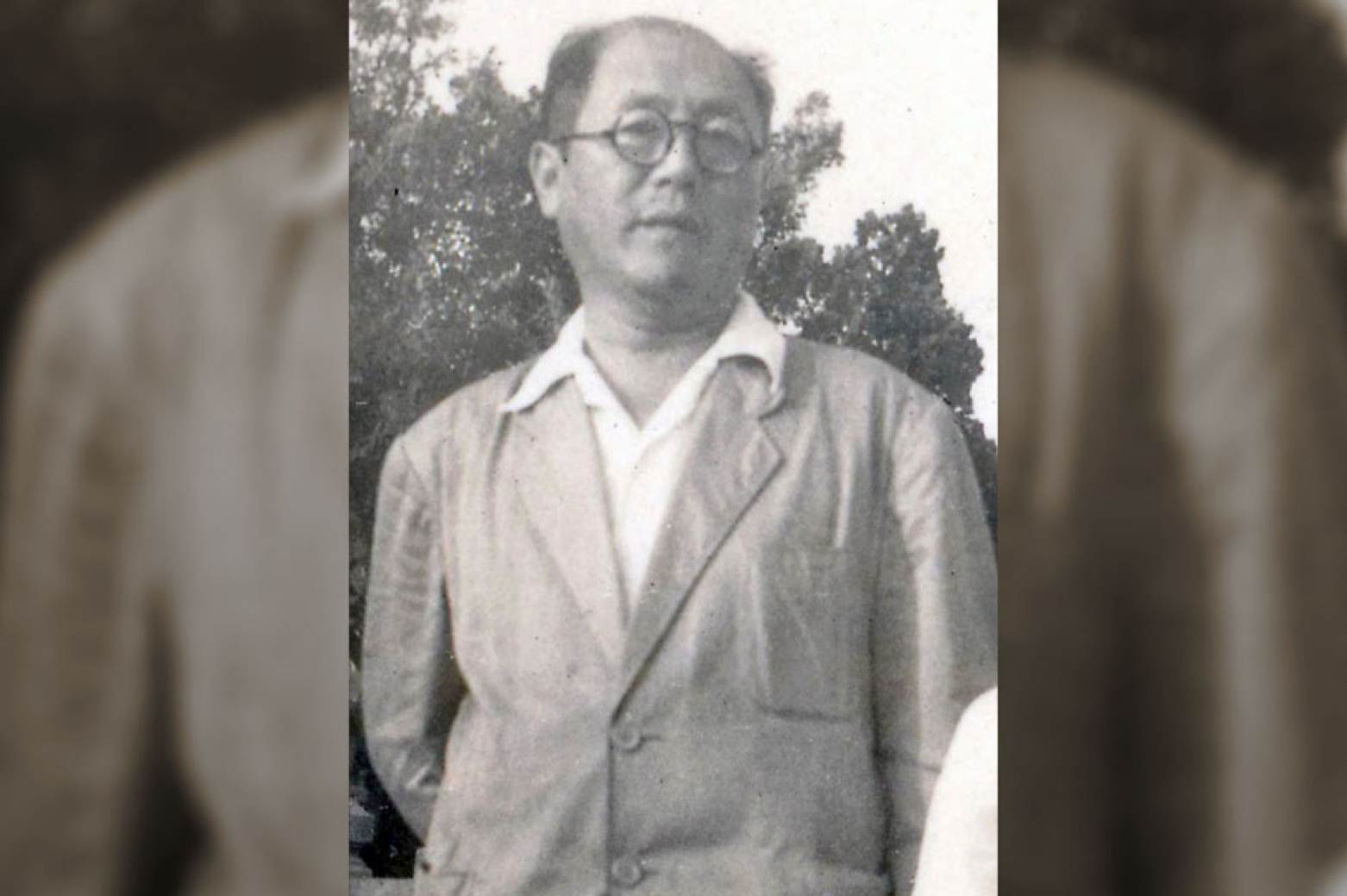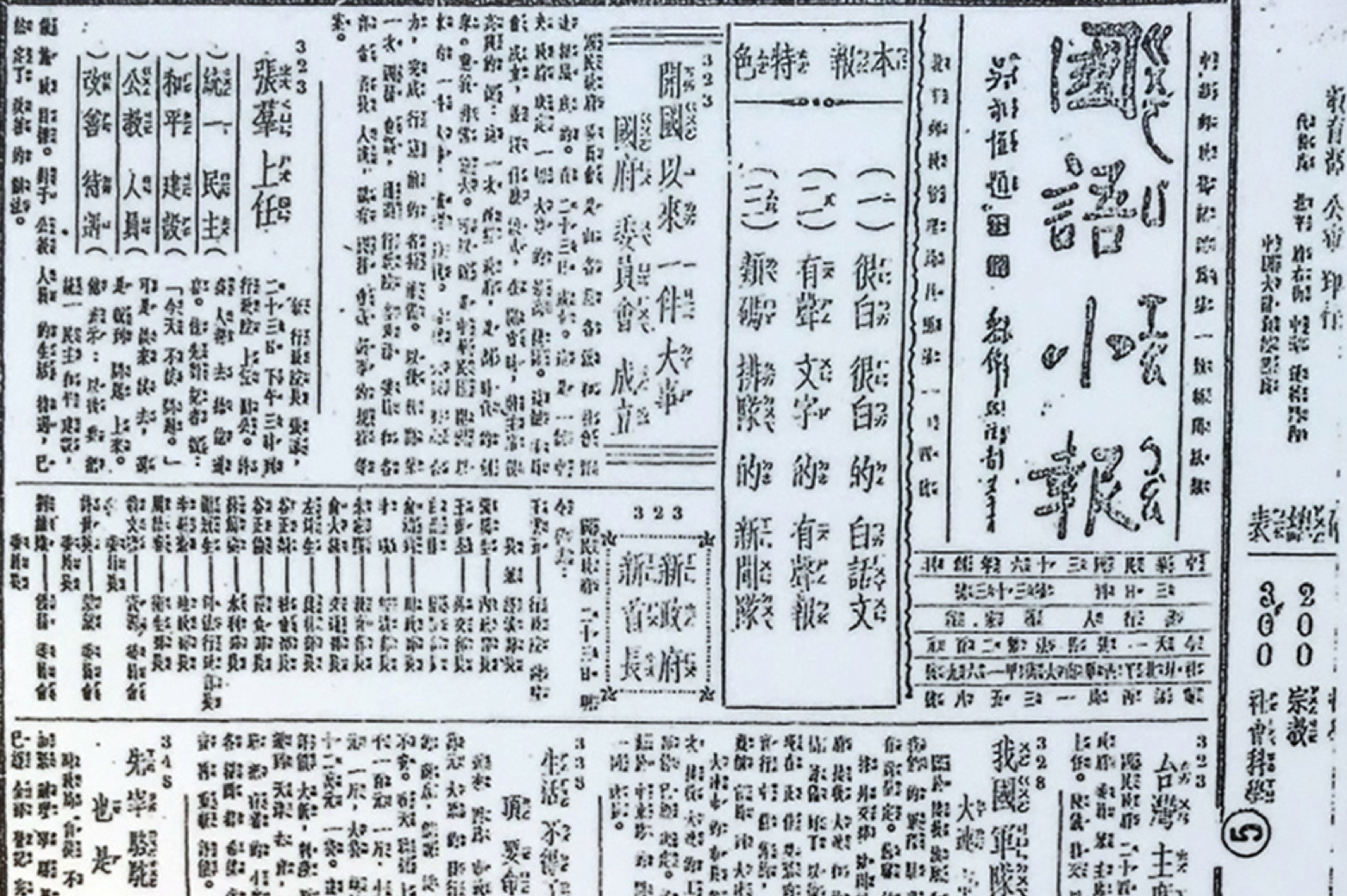Chinese Daily Survived Its First Year
Author: Peter Wang
Translator: Yingxian Wang

Chinese Daily in the early days. (Photo contributed by author.)
The first issue of “Chinese Daily” was published on October 25th, 1948, the Taiwan’s Return to China Day. It had a difficult birth. My father was the only person who had any experience running a newspaper. He was in charge of the “Little Chinese Paper” in Peking. The paper was a three issues per week paper, where every Chinese character was annotated with ZhuYin. A student can read the paper with the right pronunciation if they recognize ZhuYin. It sped up the Chinese Character learning process, and helped raise people’s Chinese level.
I remember our family lived in the backyard of the “Little Chinese Paper”’s office in Peking. Our living quarter is a one story house converted from a former warehouse. It had the old fashioned windows and doors. The windows were pasted with half translucent paper. On change of seasons, new white paper would be pasted on the windows. Going home in a winter evening, one would see the warm candle light coming through paper on the window. That was our cozy home. There was an old, huge mulberry tree in the courtyard. Climbing up the top branches to pick mulberries,… these are my cherished childhood memories.
Uncle Jiangong Wei, chairman of the Mandarin Promotion Committee, often came and had long talks with father, urging him to start the Chinese Daily in Taiwan. Taiwan was where it needed Mandarin Promotion the most. My dad was very reluctant to leave the city where he grew up and went to school. He hesitated for a long time. In the end, he convinced himself, “I will spend 3 years, at most 5 years, when the newspaper is established, we will come back to Peking.”
In the spring of 1948, father embarked on a ship with the printing press and a set of copper molds with phonetic symbols. The latter is used to cast large and small typefaces with phonetic symbols. He landed in Keelung. The same fall, mother brought my brother and I to Taiwan on Meixin Steamship after first traveling to Tianjing and Shanghai.
Father is the first Vice President of “Chinese Daily”. He was in charge of everything, big and small, of the newspaper. The president was a celebrity who worked part-time at the newspaper. He seldom show up in the office. The Chief Editor at the time was father’s classmate from Beijing Normal University, Mr. Rongruo Liang, with Deputy Chief Editor Mr. Chengying Xia (Also Hefan), and the young Liang Lin in the Editorial Department. The newspaper was underfunded and poorly staffed. In those days, father was very busy, leaving home early and returning late every day. His waistline thinned. The first issue was scheduled to be published on October 25th, 1948, because that date was Taiwan’s Return to China Day. The date has great significance.

First Chief Editor of “Chinese Daily” Rongruo Liang, a graduate of Beijing Normal University. (Photo contributed by author.)
In reality, conditions were far from mature. Every department was understaffed. The typesets for phonetic symbols were not enough, the printing press was run-down. There was great challenge in producing the first issue on Taiwan’s Return to China Day. But how could you disobey the order from up above? The compromise was: Do our best to publish the first issue on October 25th, then regroup after a few weeks. As soon as ready, we will publish the newspaper regularly.
I was very excited when holding the first issue. It was only one small sized paper. I finished it quickly, then asked father: How come our paper is smaller than other newspapers?
“What does a kid know?” he replied, “Chinese education is sacred. There is only one newspaper with ZhuYin in the whole world.”
I didn’t know that much. But I understood that “Chinese Daily” was different from the other papers. I also liked to read it, because its content was easy to understand. You can correctly pronounce every word. This point was very important. Under father’s tutelage, our family were required to have correct pronunciation. If anybody made a mistake, he would be corrected immediately. Especially my elder brother, he would not let go if he discovered my mistake. Furthermore, he would ridicule me for a long time. Once I mispronounced the name “Zixuu Wu” to “Ziken Wu”, he didn’t leave me in peace my whole life.

Author’s father, also the first Vice President of “Chinese Daily” Shoukang Wang. (Photo contributed by author.)
During the early days of the newspaper, father worried daily. Few people knew about “Chinese Daily”. It had very limited circulation. I remember him worrying about sales volume. He often paced back and force in our house, talking to himself:
“How many papers have we sold today? Sigh, this is not enough! But it’s much better than last week”
In my memory, the educators of my father’s generation shared a special devotion to Chinese education. They worked hard, but with no complaint. They perservered with their dedication. One afternoon, Dad and Uncle Rongruo Liang passed a Christian congregation in Nanhai Road near the Botanical Garden. (This congregation still maintained the original look to this day.) The enthusiastic christians were handing out pamphlets on the road side. No pedestrians could escape. They blocked the road, insisting on having the two gentlemen listen to a well-known minister preach inside.
Uncle Liang laughed: “Please let us pass. The Bible said: the road to heaven is open to all people.”
Father said: “We already have other faith.”
The christian followers grew more unrelenting, telling them to be careful, not to worship idols, or join a cult. Father told them:
“Our religion doesn’t have idols. It’s the religion of “Chinese””
When hearing from the Department of Education again, the government would no longer fund them. Although initially the “Chinese Daily” was created in Taiwan under the order of the Department of Education, due to unfavorable outcomes from the civil war, budget became constrained. Any work in culture or education was not prioritized:
“You need to plan to be self-sufficient. Don’t count on any more money from the Department of Education.”
A party veteran, Mr Zhihui Wu, also said: “You should operate it as a social enterprise.”
In reality that “public source” only allocated 10,000 Golden coupon to the Newspaper. It devalued quickly and had been spent long time ago. The first issue of the “Chinese Daily” was published on schedule. However, it needed time to open the market for this new paper. The financial source was now cut off, the paper was facing the crisis of closure and bankruptcy as soon as it had been opened.
Through a lot of efforts, the “Chinese Daily” won a big business. The Taiwan Provincial Department of Education wanted 300,000 copies of “three People’s Principles”, “the Principles of the Republic” etc. Every character needed to be annotated with ZhuYin. At that time the “Chinese Daily” newspaper was the only place capable of printing such books in Taiwan, in fact, all over the world. The bulky and heavy copper mold for ZhuYin symbols Vice President Wang brought from Peking came in handy. The income from printing those books enabled the newspaper to survive.
The seniors for Chinese education established a board of directors for “Chinese Daily”. The President of the National Taiwan University, Sinian Fu, became chairman of the board. None of the directors of the board drew salaries. Some directors donated their royalty to the newspaper. Their many years of selfless devotion was able to stabilize the situation. The newspaper has been in circulation every day, uninterrupted, these past 70 years. It thrives to this day.

The Little Chinese Paper managed by Mr. Shoukang Wang in Peking. (Photo is contributed by author.)
“Chinese Daily’ was an “abandoned baby” of the Department of Education. However, after all these years, this abandoned baby has accomplished something big: every generation of children in Taiwan would strive to read “Chinese Daily”. I often hear people say “I grew up reading Chinese Daily”. It is so true. It helped people read classical and modern selected works, and improve their Chinese. It published many kinds of books and publications. Many of these publications garnered awards. Every year, it holds the Youth Mandarin Billiards Contest. The contest cultivated many national players. It is hard to enumerate its many contributions.
“Chinese Daily” went through much difficulties. However, it survived the first year. As the first anniversary approached, father said:
“Although we are poor, we should celebrate. It hasn’t been easy to come through. We should have a party no matter what!”
There is another organization in the Botanical Garden: Taiwan Film Studio. Father knew the head of the studio Director Congmei Yuan. They agreed to let father borrow the studio for a banquet. That evening, a dozen round tables were set up under the tent. People also assembled a little stage, decorated with ribbons and balloons. The whole place were crowded with adults and children.
The ceremony started. Several “uncles” went up and gave speeches. Father was the most eloquent. He thanked his staff for their year long hard work. He said the mission of Chinese education must go on. “Chinese Daily” was the one and only in the world. It would get better and better. He also told a few old jokes that we had heard at home many times. But the audience were ebullient.
Father continued: “Our newspaper is not rich. We will have a simple banquet today. There is no lavish fish or meat dishes. But we are providing my childhood favorite New Year specialty. When I was young, we could only eat this one the Lunar New Year in my hometown. Today, we will eat this. Please eat to your heart’s content. I guarantee there is enough to go around. I also guarantee it’s delicious. Thank you!”
A big wash basin was set in the middle of every round table. Inside there were: Chinese cabbage, glass noodles, tofu, radish and pork belly. All cooked together. This was the only dish.
Born in a rural village in northern China, father experienced many famines as a child. Grandpa mixed chaff into grains to satisfy their hunger. The family barely survived. Grandpa named his son Shoukang (live long and healthy. Kang rhymed with the Chinese character for chaff.), because he lived thanks to “chaff”, reminding his son never to forget the hardships from the past. When he was young, father always looked forward to the Chinese New Year, because there was meat in New Year’s dishes. The “meat” he dreamed of since childhood is the thing in the big washing basin, port fat with skin attached, and a tiny bit of lean meat on top, boiled for so long, it’s hard to chew.
The northern dish father arranged was not popular. There was a big portion left over. However, nobody left the banquet. The celebration was a lot of fun. There were chorus; solo as well as ensemble harmonica performance; Dad played the Xiao (an vertical bamboo flute from ancient Chinese). He had a limited repertoire: Su Wu tending the sheep, poems on Mulan; Zihe Wang’s Sorna (another Chinese instrument, similar to horn) performance, the shingles were vibrating with his play; There was also magic show. Yizi Xia, the elder son of Fan He, scurried everywhere. He was blowing on other people’s instrument, producing no sound but a lot of saliva.
The most awesome program was imitations performed by Aunt Shuxiu Cui from General Services Department. She impersonated the president, the vice president, and the chief editor. She replicated their expressions when they were walking or talking, their unique laughter, their postures when smoking, how they mounted or dismounted from the bicycle. Her performing talent was astonishing. While she acted, she would ask people to guess. The young editor Rude Yang was the most engaged. He guessed most of the people Aunt Cui impersonated. The interactions up and down the stage was contagious.
The last program was a raffle. Dad got a comb. But there was little hair left on his head; Xuezong Ma from the Editing Department got a toothbrush. He had only a few teeth left, although he had a head of gray hair. Wang and Ma decided to exchange their prizes. The whole house applauded them. Everybody was happy. Later somebody drew a comics based on the episode. It was published in “Chinese Daily”.
Dad said: “Our first anniversary celebration is Happy go lucky!”
The author is a film director, an actor and a writer.
